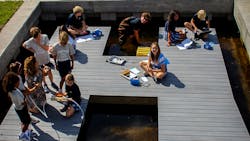South Florida students aim to help solve water issues
Students at South Florida's Saint Mark’s Episcopal School, have opened a first-of-its-kind in STEM experiential learning that aims to foster awareness and solutions to sea level rise, water quality, marine habitats, hydroelectricity, and identification of microplastics, forever chemicals and other contaminants. SeaLab is an on-campus, engineered tidal pool built on the Middle River in Fort Lauderdale that will allow students to learn and test solutions to address the global water and sustainability issues.
“A scientist in California once said to me that there is no more water on this earth," Dr. Spencer Taintor, head of school at Saint Mark’s shared. "What we currently have is all we will ever have. Our students see water all around them in the ocean, rivers, and the Everglades. It may feel endless, but we have to educate our youth that water is both valuable and scarce, with a water quality crisis growing every day. We hope that this will inspire students, both from our school and beyond, to be solution makers in solving these problems rather than just passive observers.”
Educational tools such as SeaLab teach students about sustainability and the environment. It encourages children to become more involved in their communities while fostering critical and creative thinking skills needed to solve tomorrow's problems.
Created and designed with the help of Brizaga, SeaLab is a 20-by-20-foot manufactured tidal pool behind a seawall on a river basin with a two-to-three-foot tidal surge twice daily. Holes were drilled into the wall separating the river from the tidal pool, allowing water and sea life to flow naturally in and out with the tides. An internal dock structure was built so students could access the water to conduct experiments.
“Our students will be able to use SeaLab, in conjunction with modules and experiments developed by our university partners, to identify and test for harmful contaminants in our waterways while bringing awareness to the problem on a local level. They will be given the knowledge and tools to get out there and find solutions,” Taintor said.
University partners include Nova Southeastern University Halmos College of Arts and Sciences and Guy Harvey Oceanographic Research Center and the University of Miami Rosenstiel School of Marine and Atmospheric Science.
SeaLab was designed to tackle several local challenges in South Florida but with applications that can help other communities across the country. Students will be tasked with creating economical seawalls with the intent of trying to limit saltwater intrusion. They will also look at microplastics in the water supply and waterways. There are also plans to begin oyster seeding and explore tidal hydroelectric energy production.
“Simply put, water in this world is in trouble, and it is growing more and more scarce and more and more polluted," Riggs Eckelberry, CEO of OriginClear said. "The bright side is that something can be done about these problems. The more we bring light to them, encourage both curiosity, and instill the idea that there are solutions that can be found in the younger generation, the better a world we will all live in. Seeing young minds interested in protecting our environment is truly incredible, and I think all the resources and encouragement we can give them now will greatly improve the future of our beautiful planet.”
When asked what else is in the works for Saint Mark’s Episcopal School and its students, Dr. Taintor shared, “We are currently in the design and permitting phase for wet labs to complement the SeaLab, which will allow us to further experiment with water recycling and other areas of water.”
